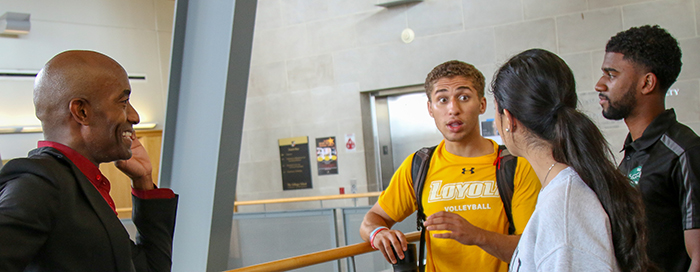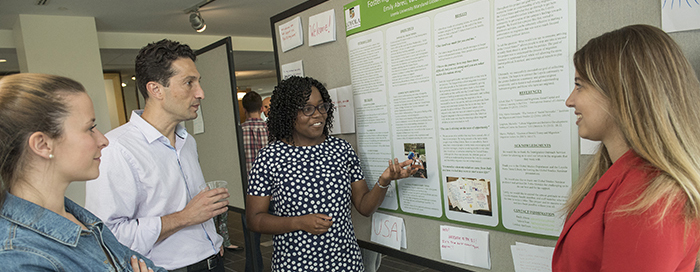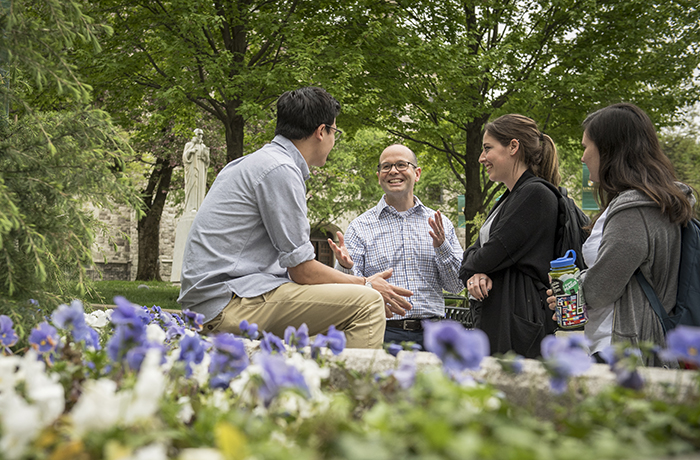We do all we can to make sure all students accepted to Loyola can afford it.
As a Jesuit university, we are committed to making a Loyola education affordable and
attainable for students from all financial backgrounds. That’s why 99% of students
currently enrolled at Loyola are receiving some form of aid—and our average net price
for first-time students who receive aid is $34,711.
When you’re considering Loyola, you and your family may have a lot of questions about
how you will cover the costs of tuition, housing, and other expenses, and our financial
aid team is here to help! Our experienced financial aid counselors are dedicated to
helping each family plan for their educational expenses at Loyola.
Affordability
A Loyola education is more affordable than you thinkOnce you factor in merit scholarships and other forms of financial aid, you may discover that the actual out-of-pocket cost to attend Loyola is more affordable than you think. Our generous financial aid packages can help fill the financial gap between the total cost of attendance and what your family can contribute.
Loyola’s commitment to affordability and transparency
As part of our commitment to making a Loyola education affordable and accessible for
all students, we are also dedicated to maintaining transparency in our pricing. A
Jesuit education is an active transformation and to benefit fully from it, it must
be directly taught, personally experienced, deeply understood, and put into living
practice. Loyola deploys its full resources to ensure that these transformative experiences
are accessible to each student—wherever their minds and hearts lead, from the day
they arrive on our campus to the moment they set foot in the world. This is why at
Loyola, our tuition cost is inclusive of many experiences and activities that other
schools often charge separately for.
Here are a few ways Loyola makes a difference when it comes to affordability and cost
to maximize your experience:
We've made the financial aid application process easier for you
Incoming and returning students can now apply for financial aid in one easy step—by filing the Free Application for Federal Student Aid (FAFSA). Please note that International, DACA, and undocumented applicants must submit the CSS Profile Application to be considered for need-based aid.
No comprehensive fee
Loyola doesn’t charge a separate comprehensive fee in addition to tuition. This fee can be as much as $10,000 for four years at other institutions.
Most universities charge additional non-academic fees for orientation, transcript requests, graduation, etc., but Loyola is different. The price you see below includes all costs directly billed by Loyola. We don't have hidden fees or surcharges, so you won't be surprised when you get your bill.
Study abroad is included in your tuition
At Loyola, you'll be able to choose from study abroad programs in more than 25 countries around the world. And any financial aid you receive from Loyola (scholarships, grants) can be used for all semester and year-long study abroad programs sponsored by Loyola.
Your merit scholarship is locked in for four years
Your merit scholarship is automatically renewed for four years (8 semesters, fall and spring) provided you maintain full-time enrollment each term (minimum 12 credits per semester), and a cumulative grade point average of at least 2.0.
Laundry is included in your room rate
You won’t need to dig out quarters for laundry on the Evergreen Campus because laundry is already included in your housing room rate. This includes two wash/dry cycles per week for a total of 30 loads per semester.
We accept outside scholarships and transfer credits
Our goal is to incorporate privately-funded awards and awards from other outside sources in a student's financial aid package as favorably as possible. Your outside scholarships will always be added to your aid package to fill in any unmet need first. You earned that outside scholarship, and we want you to receive the fullest benefit possible.
Loyola also accepts transfer credits and credit by exam, which helps to reduce the number of credit hours you need to take to graduate.
Two free summer courses for transfer students
We understand that transferring to a new college can be a difficult adjustment. That’s why Loyola offers transfer students the opportunity to take up to two free summer courses after one full semester at Loyola. These free summer sessions give students the opportunity to catch up or even get ahead in their major or core curriculum.
Programs enhancing access and affordability
In addition to providing grants and scholarships, Loyola continues to seek new and innovative ways to assist students and families with the rising costs of higher education. These initiatives include our Charm City Promise Program, Community College Partnerships, Seamless Transfer Program, and participation in the Yellow Ribbon Program.
Double Greyhound Alumni Discount
Once a Greyhound, always a Greyhound. Through our Double Greyhound Alumni Discount program, a 15% tuition discount is available to students who graduated with a degree from Loyola University Maryland and are in enrolled in a qualifying master’s degree program.
Tuition, housing, and food plan costs
While the tuition, housing, and food costs for 2026-27 are $81,440, the actual cost
most families pay is much lower due to financial aid, grants, and scholarships.
At Loyola, students are only billed for direct charges, i.e., tuition, on-campus housing,
and food plans. When calculating your financial aid eligibility, Loyola considers additional expenses which you may incur outside of your bill from
the University—such as books and supplies, transportation, and miscellaneous personal
expenses—to estimate your overall financial need.
| Expense | Fall 2026 | Spring 2027 | Total | |
|---|---|---|---|---|
| Tuition | Undergraduate (full-time), 12-18 credits/term | $30,905 | $30,905 | $61,810 |
| Deposit | Housing Damage Deposit for new residents | $45 | $0 | $45 |
| Housing | Residence Halls | $6,145 | $6,145 | $12,290 |
| Apartments | $6,915 | $6,915 | $13,830 | |
| Food | The Evergreen Plan (minimum First-Year Plan, which includes 21 Meals per week and $200 Meal Points each semester). See additional first-year and upperclass meal plan options. | $3,670 | $3,670 | $7,340 |
Determining Need and Cost of Attendance
The Loyola Office of Financial Aid uses the following federal formula to determine eligibility for need-based financial aid:
Cost of Attendance - Student Aid Index = Need
Cost of Attendance (COA)
The Cost of Attendance (COA), sometimes referred to as the student budget, is an estimate of what it will cost to attend Loyola for one year. It’s intended to help the applicant budget, but it’s also used by the financial aid office to determine eligibility for aid. The COA includes tuition; and estimates for living expenses (housing and food); books, course materials, supplies, and equipment; transportation; personal expenses, and average student loan fees.
The COA is not a bill and actual expenses will vary by student. Students who incur costs for university health insurance, dependent care, disability-related expenses, or who are in academic programs that require licensure, certification, or a first credential, and have costs associated with obtaining such qualification may request a cost of attendance adjustment by contacting the Office of Financial Aid. At Loyola, students will be billed for direct charges, i.e., tuition, on-campus housing, and food plans.
Student Aid Index (SAI)
The Student Aid Index (SAI) is an eligibility index number resulting from the information provided on the Free Application for Federal Student Aid (FAFSA). This index is calculated according to a new formula determined by the federal government. Beginning with the 2024-25 academic year, the SAI replaced the Expected Family Contribution (EFC) to determine an applicant’s need. The new formula allows a minimum SAI of negative 1,500 (-1,500) to highlight students with especially challenging situations.
Need
Need is the difference between the Cost of Attendance (COA) and the Student Aid Index (SAI). A negative 1,500 index will be treated as a zero (0) in the formula COA minus SAI equal Need. Once we calculate your need, we can determine a student’s eligibility for grants, student employment and loans. Though we cannot guarantee to meet full demonstrated need, we strive to provide funding that makes it possible for students to attend Loyola. Students who have no financial need are eligible to be considered for non-need-based loans.
Cost of Attendance: 2026-27 Academic Year
Tuition is actual. On-campus housing is based on the average cost of all available housing. Food considers 21 meals per week. Actual costs may vary by student choices.
On-Campus/Resident - First and Second Year Students
| Expense | Cost |
|---|---|
| Tuition | $61,810 |
| Living Expense: Housing | $12,600 |
| Living Expense: Food | $7,340 |
| Books, Course Materials, Supplies, Equipment | $800 |
| Transportation | $500 |
| Miscellaneous Personal Expenses | $500 |
| Student Loan Fees | $70 |
| Total | $83,620 |
Living With Parent - All Class Years
| Expense | Cost |
|---|---|
| Tuition | $61,810 |
| Living Expenses (housing and food) | $5,600 |
| Books, Course Materials, Supplies, and Equipment | $800 |
| Transportation | $500 |
| Miscellaneous Personal Expenses | $500 |
| Loan Fees | $70 |
| Total | $69,280 |
On-Campus/Resident - Third and Fourth Year Students
| Expense | Cost |
|---|---|
| Tuition | $61,810 |
| Living Expenses: Housing | $12,600 |
| Living Expenses: Food | $4,800 |
| Books, Course Materials, Supplies, and Equipment | $800 |
| Transportation | $500 |
| Miscellaneous Personal Expenses | $500 |
| Loan Fees | $70 |
| Total | $81,080 |
Off-Campus - All Class Years
| Expense | Cost |
|---|---|
| Tuition | $61,810 |
| Living Expenses (housing and food) | $10,600 |
| Books, Course Materials, Supplies, and Equipment | $800 |
| Transportation | $500 |
| Miscellaneous Personal Expenses | $500 |
| Loan Fees | $70 |
| Total | $74,280 |
2025-26 Academic Year Costs
| Expense | Fall 2025 | Spring 2026 | Total | |
|---|---|---|---|---|
| Tuition | Undergraduate (full-time), 12-18 credits/term | $29,575 | $29,575 | $59,150 |
| Deposit | Housing Damage Deposit for new residents | $45 | $0 | $45 |
| Housing | Residence Halls | $5,850 | $5,850 | $11,700 |
| Apartments | $6,585 | $6,585 | $13,170 | |
| Food | The Evergreen Plan (minimum First-Year Plan, which includes 21 Meals per week and $200 Meal Points each semester). See additional first-year and upperclass meal plan options. | $3,495 | $3,495 | $6,990 |
First-Year & Sophomore Residential Students Required Meal Plan
| Name | Description | Fall 2023 | Spring 2024 | Total |
|---|---|---|---|---|
| The Evergreen Plan | 21 Swipes per week & $200 Meal Points per semester | $3,495 | $3,495 | $6,990 |
Junior, Senior & Commuter Meal Plans
| Name | Description | Fall 2023 | Spring 2024 | Total |
|---|---|---|---|---|
| The Evergreen Plan | 21 Swipes per week & $200 Meal Points per semester | $3,495 | $3,495 | $6,990 |
| The Greyhound Plan | 14 Swipes per week & $200 Meal Points per semester | $3,095 | $3,095 | $6,190 |
| The BMore Plan | 100 Swipes & $400 Meal Points per semester | $1,795 | $1,795 | $3,590 |
| Junior Meal Points | 1,300 Meal Points (no Swipes) per semester | $1,300 | $1,300 | $2,600 |
| Senior Meal Points | 1,000 Meal Points (no Swipes) per semester (Available to seniors and commuters only) |
$1,000 | $1,000 | $2,000 |
Price Calculators
Estimate your out-of-pocket costsOutcomes and Value
A Loyola education is an investment in yourselfWe know that while you're considering your options for college, both you and your
family are looking for affordability and value. The exceptional success of our graduates
demonstrates a return on your college investment. A Loyola education will prepare
you not just for your first steps after graduation, but for a lifetime of personal
and professional fulfillment. The people you meet, the classes you take, and the experiences
you have at Loyola will inspire you to think critically, to ask the tough questions,
to seek innovative solutions, and to value diverse perspectives.
That’s why our alumni are so highly sought-after by recruiters, by employers, and
by graduate and professional programs—and why 99% are employed or pursuing graduate or professional degrees within 6 months
of receiving their Loyola diplomas. We invite you to learn more about how Loyola prepares you for life. All of it.


Types of Aid Available
Making A Loyola Education Possible
Both our merit-based scholarships and need-based financial aid programs reflect our dedication to making a Loyola education possible. Learn more about the scholarships and grants available to students.

Ready to Apply?
The timeline and application process for applying for financial aid varies by the type of student. Review our Financial Aid brochure, then follow the appropriate process to ensure you receive the maximum consideration for scholarships and financial aid.